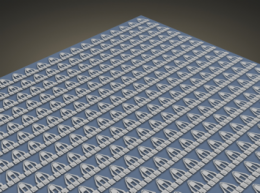June 23, 2009 weblog
A Glimpse of the Future MEMS-based Storage: Totally Green & Thumbnail Size

The University of Twente--Enschede, The Netherlands published newly conferred PhD Mohammed Ghiath Khatib's thesis, "MEMS-based Storage Devices: Integration in Energy-Constrained Mobile System". The new MEMS, (Micro-Electro-Mechanical Systems) discovery will allow video camera batteries to increase their charging life approximately 2-1/2 times, consume 1/5th of the energy of disc storage and store 1-Tb on a postage stamp size device. Dr. Khatib expects this new technology to be available to the public within the next five-years.
MEMS technology is currently used in iPhone and Wii devices. Dr. Khatib's MEMS technology differs insofar as it optimizes the technology for use as a data storage device. The high-end Green technology discovery is less expensive to produce. The cost to operate will be cheaper than any other known memory device available for mobile devices. Dr. Khatib's discovery is as effective as flash memory, but more cost-effective in all respects.
According to the University of Twente spokesperson, "this new green storage technology with extremely high data densities has shown experimentally a storage density of 4Tb/in2 in a demonstration. In effect this means that when this technology is fully developed, it will be possible for a storage device to be reduced to the size of a fingernail, with a capacity of 1 Tb, (200 DVDs) and energy consumption remains extremely low. Thereby, MEMS combines the advantages of a disc (inexpensive) and a memory card (energy efficient)."
Nearly everyone is familiar with digital still or video cameras. Video cameras often use storage on a disc such as a DVD (disk storage). Cameras often store their data on a memory card, such as a flash card (flash memory). Both methods have their own disadvantage. The cost of disk storage requires a lot of energy and the battery must be recharged often. Storage on a memory card is costly. Dr. Khatib's method combines the best of both worlds and delivers a product which has low energy consumption with the advantages of high-density data storage on a low cost disc.
Dr. Khatib received his PhD on June 11, 2009 from the TU Faculty of Electrical Engineering, Mathematics, and Computer Science and the Centre for Telematic and Information Technology under the supervision of Professor Pieter Hartel and Dr. Leon Abelmann. The research was funded by the technology Foundation, STW.















